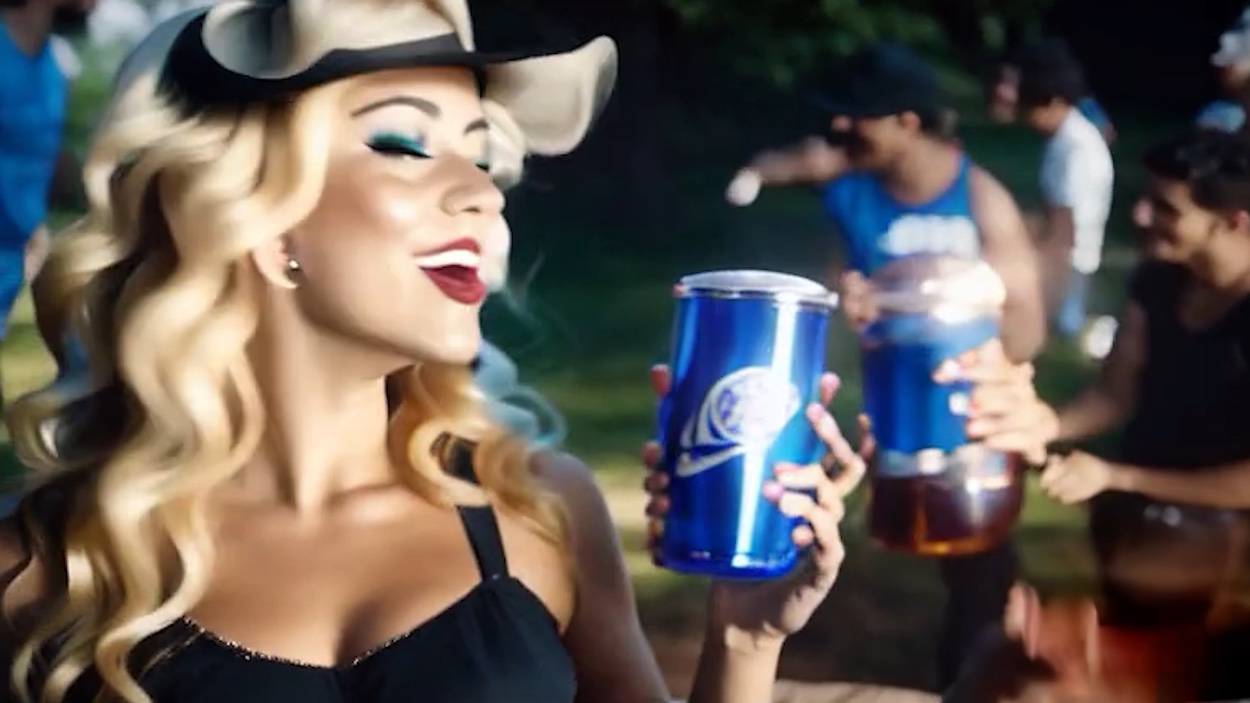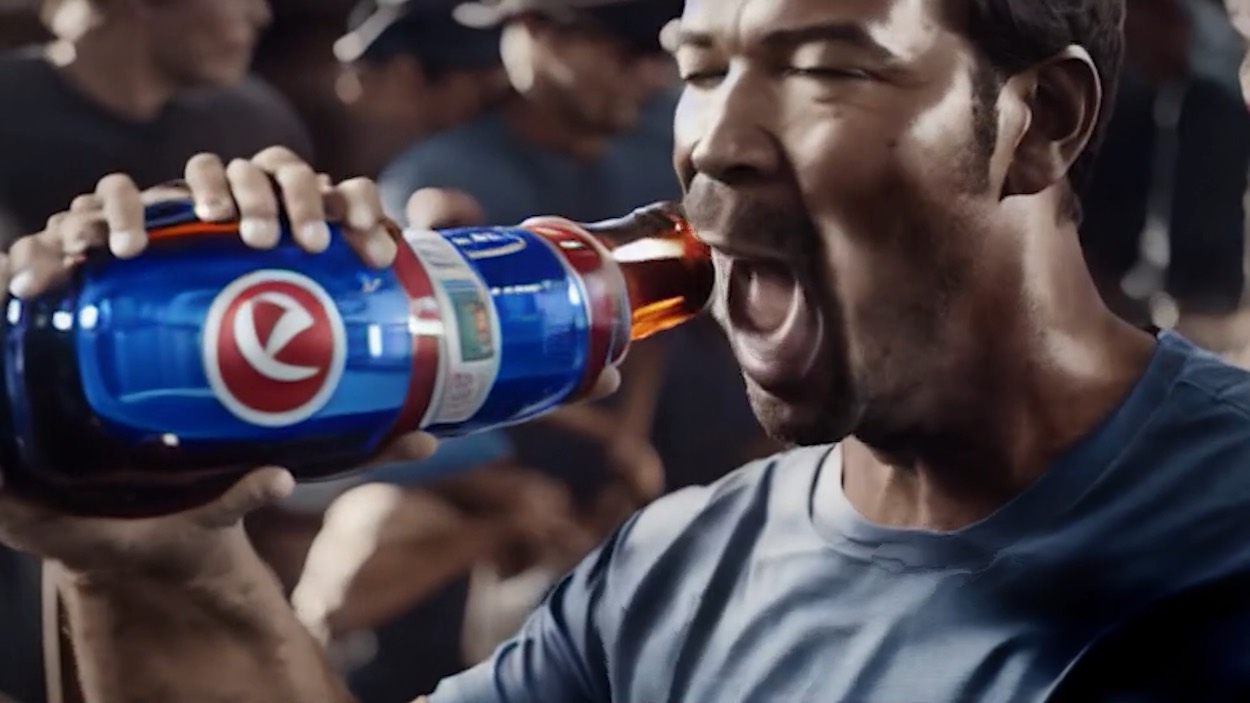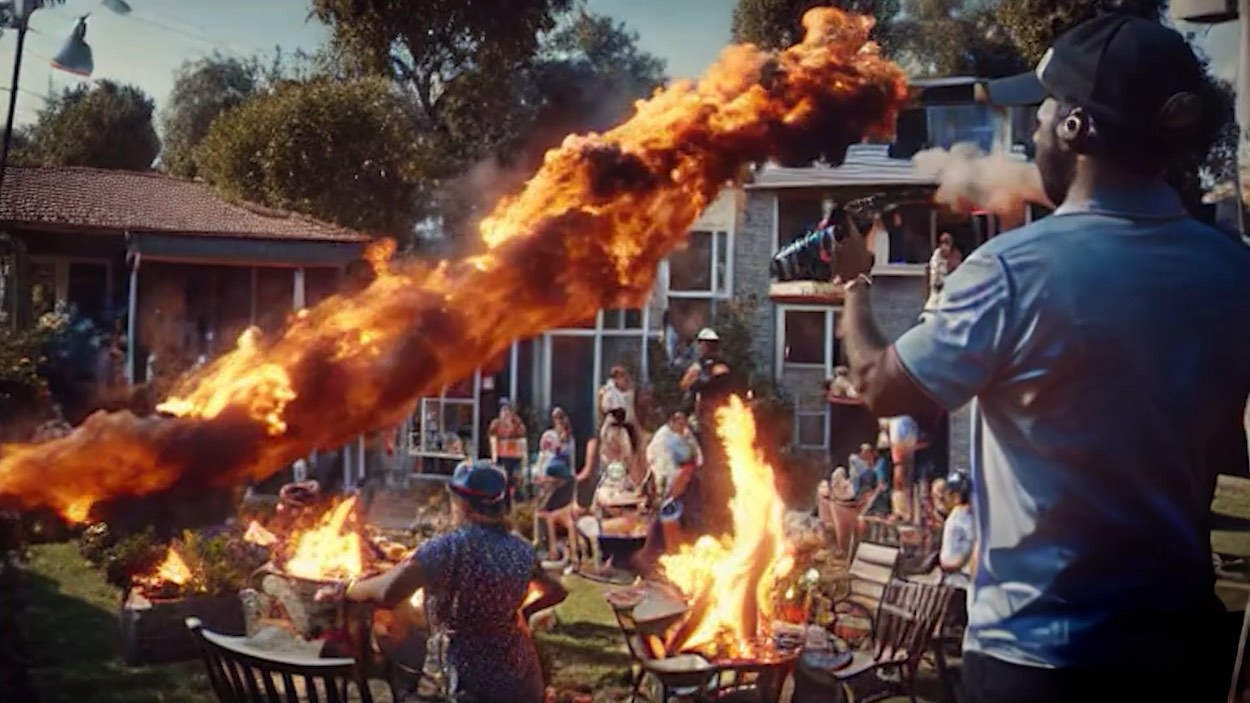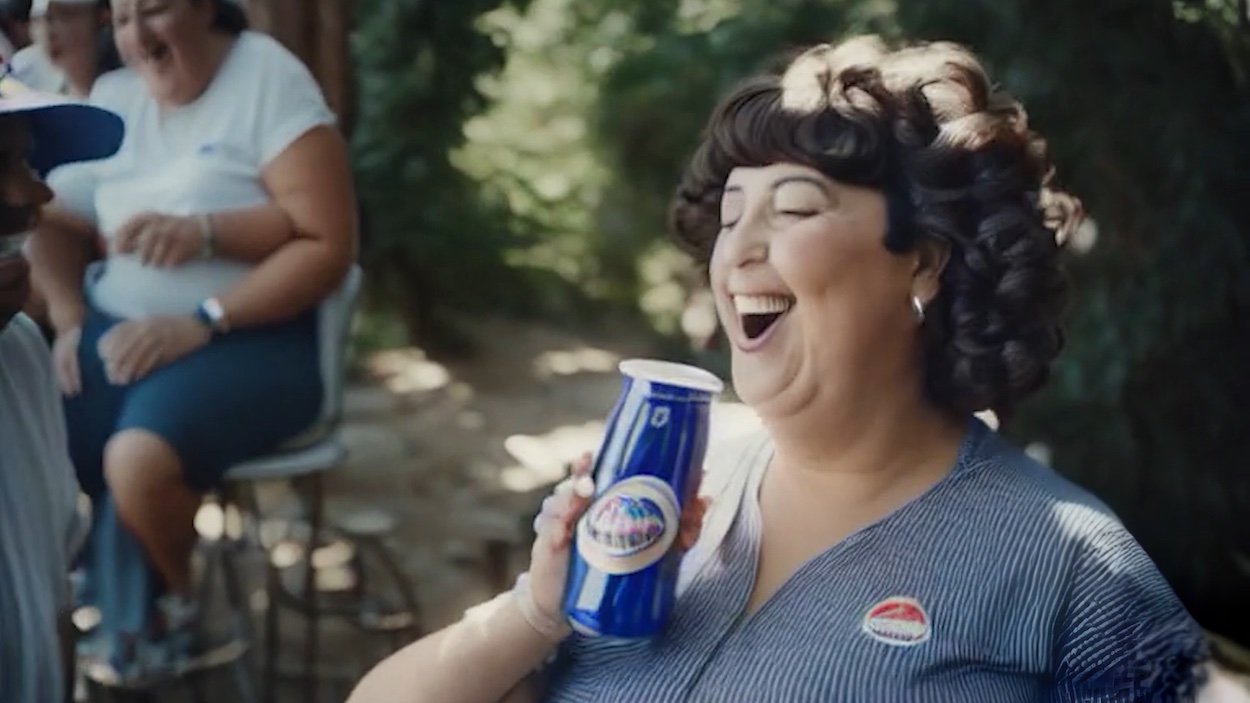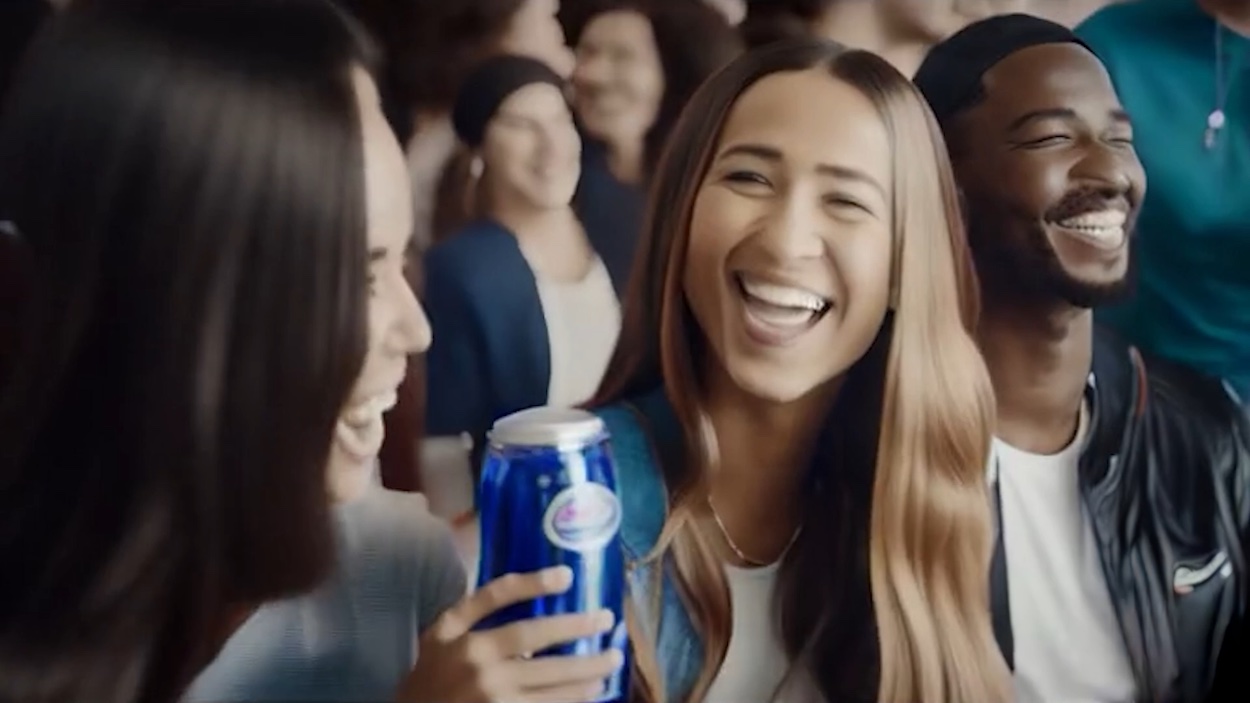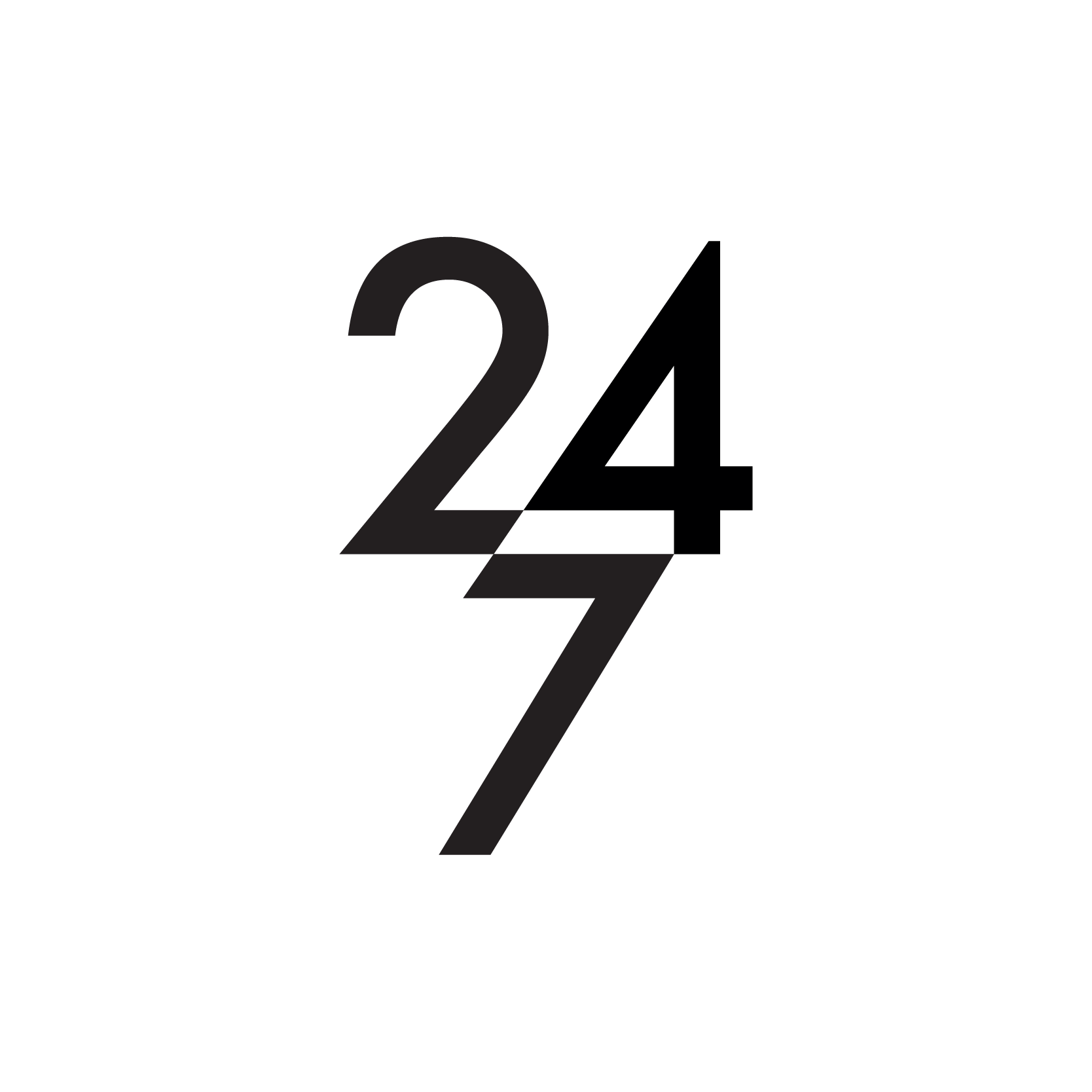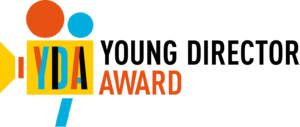Well you’ve obviously had a crazy week…
Yeh, well… It’s been unexpected to say the least. We’ve always made stuff and just kind of put it out there and occasionally it’ll do the rounds on Reddit or something. But with this one I think we were in the right (or maybe wrong) place at the right time with this weirdly realistic depiction of hell. Given all the conversations around AI at the moment and the whole Drake x Weeknd track, and a certain news cycle we won’t get into. Something about this project just seems to have accidentally hacked the attention algorithm.
Hopping back to the start of your creative career – you worked on projects spanning experiential theatre and videogame cinematics as well as promos before diving into commercials. How do those thread to where you are now?
I think it’s so important to try your hand at all different kinds of mediums because I think eventually long term it all ends up blending together. And I think that’s very much why I ended up what’s loosely called mixed media. There are a lot more grey areas emerging around the whole process of how we produce things creatively right now. And I guess that connects to the whole idea of Private Island as this sort of space that exists outside of but in parallel to the usual way the industry has gone about creative production.
We’ve deliberately chosen not to follow the traditional director representation model because we want to focus on making work and not running a business in that sense. So, we’ve built something that’s more like this mischievous and self-determining space where we have an incredible group of creative minds who parachute in and out of certain projects because we align around an ambition or something we want to make together. And it’s that mindset that has attracted agencies and brands into our unusual ecosystem of ideas and ways of doing things. Those commercial opportunities are what allow us to then go away and hide at the centre of the Island for a while and concoct more of the chunkier self-generated projects. And they invariably end up being the best form of new business.
Speaking of the unusual – your personal site hints at a persistent curiosity with the work of H.P. Lovecraft. What is it about his writing that interests you?
It’s the specific themes he tackles that fascinate me and the way they still correlate to what we’re going through in the present day. The innate fear of the unknown and the insignificance of humanity are really relevant to a lot of the work we do. That sort of creeping, lurking fear of the thing we don’t understand and our insecurities around that. I guess that’s why the AI stuff appeals to me. This feeling that AI is this vast alien intelligence, and we’re sort of just training one part of it to present as human essentially without understanding any of the true particulars of that. It’s almost being treated as this weaponized reflection of ourselves. We’re at the moment on the Titanic where the guy has just spotted the iceberg with binoculars and there’s a lot of stuff that can happen from this point. So that Lovecraft steer has permeated a lot of work I do outside of commercials.
So to the AI elephant in the room – your creepy beer and pizza party… Why?
I think there’s something really enjoyable in that aesthetic. When we look at synthetic video it plays with our lizard brain in a very interesting way. Our brains are good at perceiving through Bayesian models where we’re constantly filling in the blanks so we can multi-task. So when you watch something like that video your brain is telling you “oh cool, it’s just a party, people are having fun”. But subconsciously you’re picking up that people’s heads are screwed on backwards, that everything is wrong, but it’s only your hindbrain that’s flagging all this stuff.
I think that’s fascinating – how that tweaks our perceptions and our sense of horror. There’s this sort of a quasi-sentient glitching happening. It messes with the neurology of your brain. The visual signifiers are there to read ‘happiness’, ‘friendship, but there’s a primal response around your fight or flight hardwiring. When you watch it, you can’t help but have the feeling that you’re shaking hands with a Neanderthal.
So where do you stand on AI overall, beyond its use as a creative tool?
We do need to have smarter conversations about it and I do think the WGA is having the right sorts of conversation about it. When we first screened the film to a small audience they were like “which bits of it are fake” and of course the answer is “all of it”. It goes back to that hindbrain moment, and we need to zoom out of the industry and look at some of the societal changes that are inbound.
At Private Island we jumped in relatively early on all this and there was a moment last summer where I said to Helen [Power], we need to start doing a gentle pivot towards using this more actively. Two years ago, it would take nine months, a year to go from a Google White Paper to running an AI model on your computer and now it happens live on your computer and tens of thousands of people are doing it. When you’ve got people leaving Google shadowing Oppenheimer, you just need to legislate fast and with teeth.
All of this stuff is being developed inside walled gardens and we’ve struggled to grapple with big tech for years anyway. Not that I’m necessarily putting this at their feet, but you can’t have Elon Musk one week being a signatory to a moratorium on all AI development and the next week buying tens of thousands of GPUs to start his own AI company. Governance needs to be done carefully, but it needs to be done fast. We can talk about copyright, but the ramifications are kind of bigger than that. Not that we should underestimate that as people’s livelihoods are at risk.
There is a feeling with AI models that they’re like woodchippers where you’re throwing everyone else’s art in and it spits out another piece of art the other side with elements of the source material still visible. To be honest, that’s not how it works I don’t think, but more importantly this is just a grey moment for a lot of this stuff. In terms of the sentience or the creative merit of a machine creating something, you don’t want to give too much credit to the AI. They’re smart things, but I think a lot of this is to do with your intent, how all of this stuff lives together and what the context is.
* Check out Harlan Ellis’ vision of AI – https://www.youtube.com/watch?v=dgo-As552hY
Interview by Stephen Whelan
Private Island website
Chris Boyle website
@privateislandtv
@christboyle
Director: Chris Boyle
Production Company: Private Island
